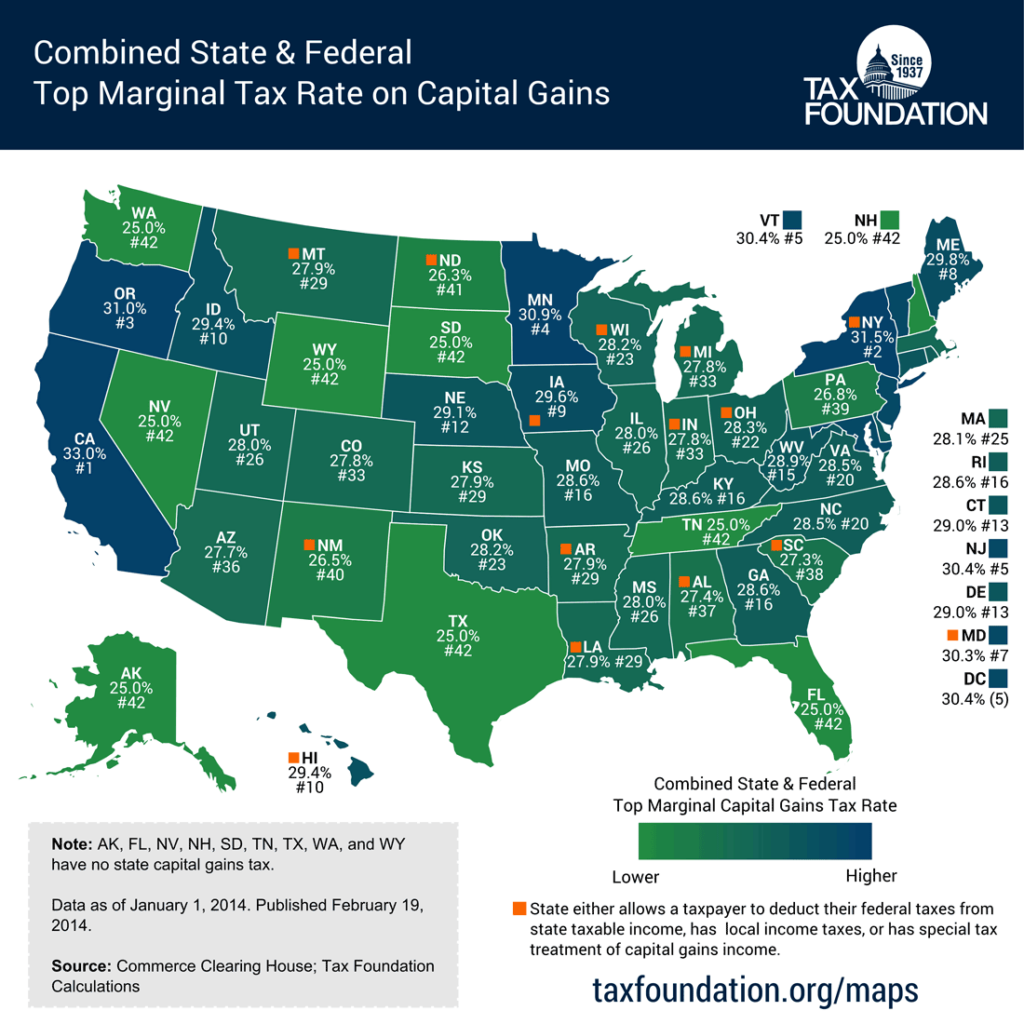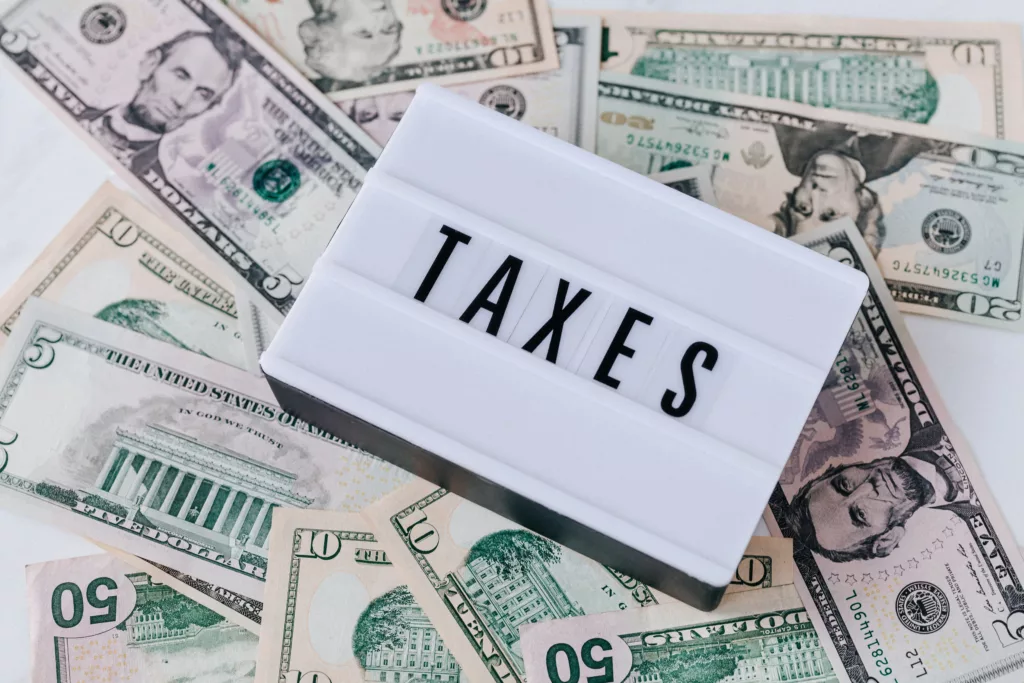Introduction to Capital Gains Tax Florida
The capital gains tax is a tax on the profit made from the sale of an asset, such as stocks, real estate, or businesses. For example, let’s say you bought a 1000 shares of a stock back in 2020 for $1000 (or $1/share) and held it for two years. The underlying price is now $2000 ($2/share). Great! You’ve maid some money – on paper. If you’d like to sell those shares and take the money and use it for something – that’s where capital gains comes into play. It’s effectively the gains you’ve realized for capital you’ve invested in some kind of underlying asset. A similar analysis is Real Estate. If you buy a home for $100,000 and 7 years later you sell the home for $260,000 you’ve effectively made $160,000 in capital gains. In some states, you’d not only owe the federal government tax on the amount realized, you’d also owe THE STATE money as well. Here’s a breakdown:
AK, FL, NV, NH, SD, TN, TX, and WY have no state capital gains tax.
AL, AR, DE, HI, IN, IA, KY, MD, MO, MT, NJ, NM, NY, ND, OR, OH, PA, SC, and WI all have special treatment of capital gains (some states effectively have no capital gains, but do so by crediting your local/state income tax against your federal income tax).
Luckily, in Florida, capital gains are taxed at the same rate as ordinary income, which is currently 0%. Thank God for red states! For a full guide on Capital Gains this a great post on the topic with up to date 2023 rates.

Many states do impose income tax on residents, but thankfully Florida isn’t one of them. Instead we’re a no income tax state – meaning no income – including Capital Gains Tax are levied on residents of Florida.
Capital Gains Tax Florida
To be clear: Florida has NO capital gains tax, but you still have to pay federal taxes if you sell a home in the state. The exact tax rate you’ll end up paying depends on several factors, including how long you owned the property and your income level (more below). Additionally you will owe sales tax on the transaction which varies based on your location.
However, there are certain exemptions and deductions that can reduce the amount of capital gains tax owed overall as well as things to consider when it comes to Capital Gains overall. This updated guide on capital gains tax in Florida provides information on the current tax rates, exemptions, and deductions, as well as tips for minimizing your tax liability.
Understanding the Basics of Capital Gains Tax in Florida
Capital gains tax is a tax levied on the profit made from the sale of an asset. In Florida, capital gains tax is not imposed on the sale of real estate, stocks, bonds, and other investments, however sales tax is. Understanding the basics of capital gains tax in Florida is essential for anyone who is planning to sell an asset and wants to avoid any legal issues.
The capital gains tax rate in the United States is based on the length of time an asset is held before it is sold. If an asset is held for less than a year, it is considered a short-term capital gain, and the tax rate is the same as the individual’s ordinary income tax rate. However, if an asset is held for more than a year, it is considered a long-term capital gain, and the tax rate is lower than the ordinary income tax rate.
The long-term capital gains tax rate in Florida is 0% however at a federal level it is 15%, or 20%, depending on the individual’s income level. For individuals with a taxable income of less than $40,000, the long-term capital gains tax rate is 0%. For individuals with a taxable income between $40,000 and $441,450, the long-term capital gains tax rate is 15%. For individuals with a taxable income of more than $441,450, the long-term capital gains tax rate is 20%.
It is important to note that capital gains tax is only imposed on the profit made from the sale of an asset, not the total amount received from the sale. For example, if an individual purchased a stock for $1,000 and sold it for $1,500, the capital gains tax would only be imposed on the $500 profit.
There are also certain deductions and exemptions available for capital gains tax in Florida. One of the most common deductions is the cost basis of the asset. The cost basis is the original purchase price of the asset, plus any expenses incurred during the purchase, such as closing costs or real estate commissions. Deducting the cost basis from the sale price of the asset reduces the amount of profit subject to capital gains tax.
Another exemption available for capital gains tax is the primary residence exemption. If an individual sells their primary residence, they may be eligible for an exemption of up to $250,000 in capital gains tax if they are single, or up to $500,000 if they are married filing jointly. To qualify for this exemption, the individual must have owned and lived in the home for at least two of the five years before the sale.
In addition to federal capital gains tax, Florida also imposes a state-level capital gains tax. However, Florida does not have a separate capital gains tax rate. Instead, capital gains are taxed at the individual’s ordinary income tax rate.
In conclusion, understanding the basics of capital gains tax in Florida is crucial for anyone who is planning to sell an asset. The tax rate is based on the length of time an asset is held before it is sold, and there are certain deductions and exemptions available to reduce the amount of tax owed. It is important to consult with a tax professional to ensure compliance with all applicable laws and regulations.
Maximizing Your Tax Savings: Strategies for Capital Gains Tax in Florida
Capital gains tax is a tax on the profit made from the sale of an asset, such as stocks, bonds, or real estate. In Florida, capital gains tax is calculated at the same rate as the federal capital gains tax, which is currently 15% for most taxpayers. However, there are strategies that can be used to minimize or even eliminate capital gains tax in Florida.
One strategy is to hold onto assets for at least one year before selling them. This is because assets held for more than one year are considered long-term capital gains, which are taxed at a lower rate than short-term capital gains. Short-term capital gains are taxed at the same rate as ordinary income, which can be as high as 37%.
Another strategy is to donate appreciated assets to charity. When you donate an appreciated asset, such as stock, to a qualified charity, you can deduct the fair market value of the asset from your income taxes. This not only reduces your taxable income, but it also eliminates the capital gains tax that would have been owed if you had sold the asset.
A third strategy is to use a 1031 exchange. A 1031 exchange allows you to defer paying capital gains tax on the sale of an investment property by reinvesting the proceeds into a similar property. This can be a great way to maximize your tax savings and continue to grow your investment portfolio.
It is important to note that Florida does not have a state income tax, which means that residents only have to worry about federal taxes. However, if you are a non-resident who owns property in Florida, you may be subject to Florida’s state capital gains tax. Non-residents are subject to a 5.5% state capital gains tax on the sale of real estate in Florida.
In addition to these strategies, there are also certain exemptions and exclusions that can be used to minimize or eliminate capital gains tax in Florida. For example, if you sell your primary residence and have lived in the home for at least two of the past five years, you may be eligible for a $250,000 ($500,000 for married couples) exclusion on the capital gains from the sale.
Another exemption is the exclusion for small business stock. If you invest in a qualified small business and hold the stock for at least five years, you may be able to exclude up to 100% of the capital gains from the sale of the stock.
In conclusion, capital gains tax can be a significant expense for investors in Florida. However, there are strategies that can be used to minimize or even eliminate this tax. By holding onto assets for at least one year, donating appreciated assets to charity, using a 1031 exchange, and taking advantage of exemptions and exclusions, investors can maximize their tax savings and continue to grow their investment portfolios. It is important to consult with a tax professional to determine the best strategies for your individual situation.
Navigating Complex Capital Gains Tax Situations in Florida: Tips and Tricks
Navigating Complex Capital Gains Tax Situations in Florida: Tips and Tricks
Capital gains tax is a tax on the profit made from the sale of an asset, such as stocks, real estate, or a business. In Florida, capital gains tax is calculated at the federal and state levels. The federal capital gains tax rate ranges from 0% to 20%, depending on the taxpayer’s income. The state of Florida does not have a state income tax, which means that there is no state capital gains tax. However, there are still some important things to keep in mind when navigating complex capital gains tax situations in Florida.
First, it is important to understand the difference between short-term and long-term capital gains. Short-term capital gains are profits made from the sale of an asset that was held for one year or less. Long-term capital gains are profits made from the sale of an asset that was held for more than one year. The tax rate for short-term capital gains is the same as the taxpayer’s ordinary income tax rate. The tax rate for long-term capital gains is lower than the tax rate for short-term capital gains.
Second, it is important to understand the concept of basis. Basis is the amount of money that was originally invested in an asset. When an asset is sold, the capital gain or loss is calculated by subtracting the basis from the sale price. It is important to keep accurate records of the basis of each asset, as this will affect the amount of capital gains tax that is owed.
Third, it is important to understand the concept of capital losses. Capital losses occur when an asset is sold for less than its basis. Capital losses can be used to offset capital gains. If the amount of capital losses exceeds the amount of capital gains, the excess can be used to offset up to $3,000 of ordinary income. Any remaining excess can be carried forward to future tax years.
Fourth, it is important to understand the concept of like-kind exchanges. A like-kind exchange is a transaction in which one asset is exchanged for another asset that is similar in nature. Like-kind exchanges can be used to defer capital gains tax. However, there are strict rules that must be followed in order for a transaction to qualify as a like-kind exchange.
Fifth, it is important to understand the concept of estate planning. Estate planning involves the transfer of assets from one generation to the next. Proper estate planning can help minimize capital gains tax liabilities for heirs. This can be done through the use of trusts, gifts, and other estate planning strategies.
In conclusion, navigating complex capital gains tax situations in Florida can be challenging. However, by understanding the concepts of short-term and long-term capital gains, basis, capital losses, like-kind exchanges, and estate planning, taxpayers can minimize their capital gains tax liabilities. It is important to consult with a qualified tax professional to ensure that all tax laws and regulations are being followed.
Conclusion
Conclusion: The updated guide on capital gains tax in Florida provides valuable information for taxpayers who are looking to sell their assets and want to understand the tax implications. It covers the basics of capital gains tax, exemptions, and rates applicable in Florida. The guide also highlights the changes made to the tax laws in recent years and provides examples to help taxpayers understand how the tax is calculated. Overall, the guide is a useful resource for anyone looking to navigate the complex world of capital gains tax in Florida.



